Vidya Ramakrishnan has worked in real estate asset management for 11 years — the last five of those years in nonprofit work at New Jersey's HANDS, Inc. As her organization considered transitioning from multifamily projects to single-family homes and other projects, she sought peer and technical support. She found both through NeighborWorks America's Advancing Leaders in Real Estate, a nine-month series of courses and collaborations that will culminate with a graduation this September in Washington, D.C. Eighteen professionals will graduate from the program.
 Funded by JPMorgan Chase, the pilot program was intended to assist real estate professionals, particularly real estate professionals of color, in gaining technical skills that would help them in project management. Joanie Straussman Brandon, regional vice president of the Northeast Region from NeighborWorks, says Advancing Leaders in Real Estate started after she heard from executives across her region about how challenging it had become to recruit and retain staff. "This was happening even before the pandemic," she shares. Her region began by offering a pilot program for middle managers. "We were hearing, at the same time, that there was a tremendous need for real estate developers to enter the industry — and stay," she says. That program, too, began as a pilot, featuring participants from the Northeast and a few East Coast states.
Funded by JPMorgan Chase, the pilot program was intended to assist real estate professionals, particularly real estate professionals of color, in gaining technical skills that would help them in project management. Joanie Straussman Brandon, regional vice president of the Northeast Region from NeighborWorks, says Advancing Leaders in Real Estate started after she heard from executives across her region about how challenging it had become to recruit and retain staff. "This was happening even before the pandemic," she shares. Her region began by offering a pilot program for middle managers. "We were hearing, at the same time, that there was a tremendous need for real estate developers to enter the industry — and stay," she says. That program, too, began as a pilot, featuring participants from the Northeast and a few East Coast states.
"This group has really melded and come together," Straussman Brandon says. "We want to keep it going."
It was the mission that initially drew Ramakrishnan to nonprofit real estate. "Going out there and seeing what the community needs really spoke to me," she shares. "I enjoy serving the population that's in need of services. I feel that this has really been my calling."
Continuing to learn about that calling has also been important. Ramakrishnan, whose initial training was in chemical engineering in India, where she grew up, has always valued education. In the real estate field, she says, it's important to keep up with both the day to day and what might be changing in the market

In addition to webinars, training and meetups, Advancing Leaders cohort members also received scholarships to attend a NeighborWorks Training Institute (NTI) and a chance to gain even more knowledge. "The entire training program has been wonderful — going through the real estate life cycle, from conception through the closing of the deal," Ramakrishnan says. "There have been a lot of takeaways for me."
One of those takeaways was learning the ins and outs of Low-Income Housing Tax Credit (LIHTC) properties. Important, too, was spending time with her mentor, Dr. Christie Cade, NeighborWorks' regional vice president of the Southern Region.
"She's an inspiration," says Ramakrishnan. "It was wonderful to understand, as a minority person and as a woman in this world, how we can move forward in our career goals, doing the work we love to do."
Ramakrishnan says she hopes to take her knowledge and put it toward structuring deals in a way that's beneficial to her organization. "I'm taking everything, not just the real estate perspective. In the program, I was able to mingle with peers. Understanding what they do has opened a lot of doors. I am confident that with this knowledge, I'll be able to bring in some changes to assist the organization as we move along."
Cade says that the mentorship program provides "a wonderful opportunity to engage and share experiences, challenges and opportunities." When mentoring, she says, it’s important to remember that it’s not just about the work, “but about the mentee’s life, their aspirations, what they’re doing and who they’re becoming. It’s about today and their tomorrows.”
Each time she serves as a mentor, she says, "I discover lessons from my own journey and expand my knowledge of how others navigate life.”
Lynn Peterson, a Northeast Region relationship manager who is serving as co-leader for the cohort, says the combination of mentorship, peer exchange and formal training has been proven to work. The range of participants — from rural to urban, from new to mid-level employees — is working too.
"The need for the cohort came from hearing about the recruitment efforts of the network and the way they pivoted to hiring people who possessed the drive and commitment but did not already have the project management background," Peterson says. "We are providing the training and mentoring to round out their on-the-job training. I've been so impressed with every participant and how engaged they have been with the program and with each other."
HDC MidAtlantic's Benjamin Van Couvering is in Lancaster, Pennsylvania, a region that includes rural, suburban and urban environments. During the course of the program, his job title changed from development officer to senior development officer. His responsibilities changed, too, he says, and the cohort helped prepare him for those, teaching him more about leadership and acquisitions management.
"The connections were the most significant part of the program for me," he says. "And getting exposed to so many different experiences. It's easy to be siloed in the work you're doing day to day. But hearing people from other states in the region broadened my outlook. It was an opportunity to learn from a range of diverse perspectives."
In Lancaster, Van Couvering is dealing with the challenges of rising construction costs and turnover in property management. It's important, he says, to develop a new generation of people with specialized skills needed for tax credit developments. Developing future leaders is important, he says. "You need a pipeline of people addressing affordable housing."
Now that he's part of the pipeline, his experience can help keep it growing in Lancaster. "I am bringing back tools to advance and to connect with others that are advancing."
For Vanessa B. McCleary, vice president of Real Estate Development at CDC of Tampa, working for a nonprofit came after a career in city and county government. "I'd worked in nonprofit prior to that, and I really wanted to get back to the nonprofit side," she says. "I didn't want to just fund housing; I wanted to be a part of it. I enjoy helping people to realize a better life, especially through homeownership."
 The cohort, she says, "covered everything I needed. If it was just a class, I would have gotten material and that would have helped. Instead, I got a whole cohort of people and we went through the journey together. I had someone to talk to. I got a mentor. It was really helpful for me, making a career change."
The cohort, she says, "covered everything I needed. If it was just a class, I would have gotten material and that would have helped. Instead, I got a whole cohort of people and we went through the journey together. I had someone to talk to. I got a mentor. It was really helpful for me, making a career change." When McCleary joined the nonprofit a year ago, CDC of Tampa was building an average of 10 houses a year. "This year, we're trying to do 30. Next year, it will be over 50!"
Expanding the staff is helping them expand what they can do, McCleary says. "One person alone can't find the property, buy the property and build the property. You need a team. Now we have a team around us that can take us to the next level." And the one-person department has grown to four people, with two more to come. The Advancing Leaders program helped her figure out the job and how to reconfigure some of the staffing elements, she says. It even led to her making a change in some of the materials they were using in building single-family homes. And at the NTI, she met a classmate and invited him to speak at an economic development summit that she helped organize. The connections have been amazing, she says, including with the women of color who served as mentors.
As Black women, she says, "we bonded around that and trying to find ways to get others into the industry." McCleary is now mentoring two women locally. "It's important to have empathy when doing this work, connecting with the community we serve," she says. "As women of color, it's a little easier for us, understanding the people and what they're going through."
In this work, she says, "you're not just building something in the community; you're building the community itself."

